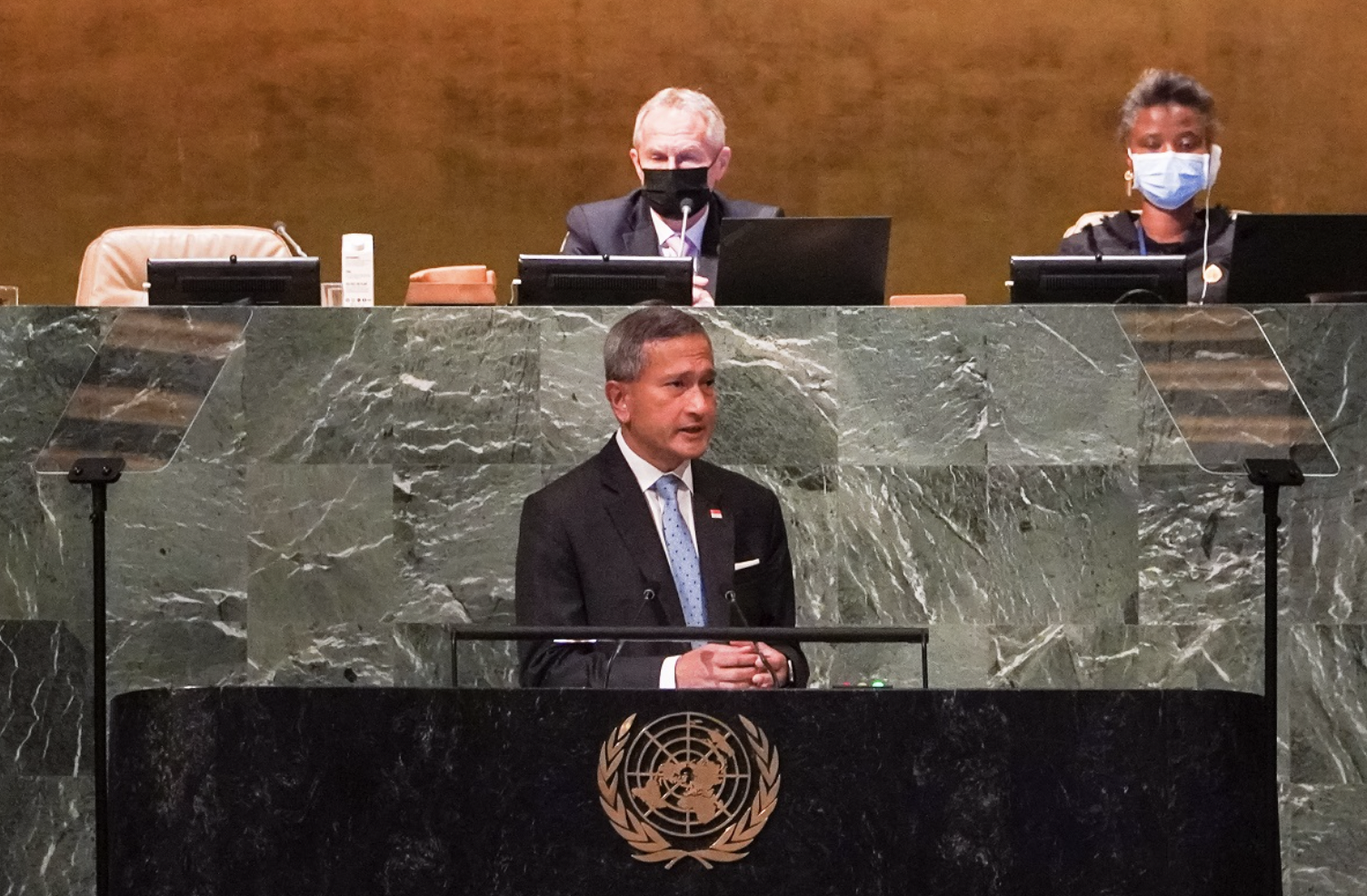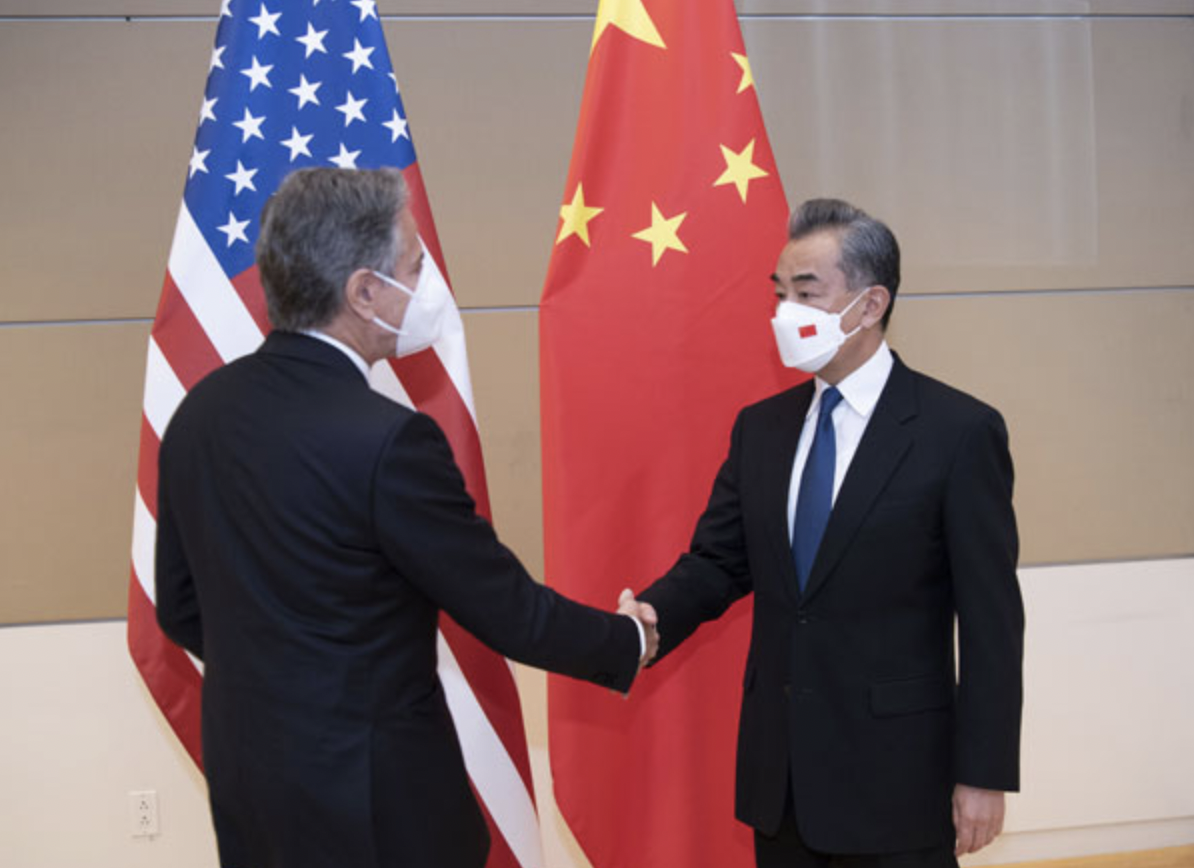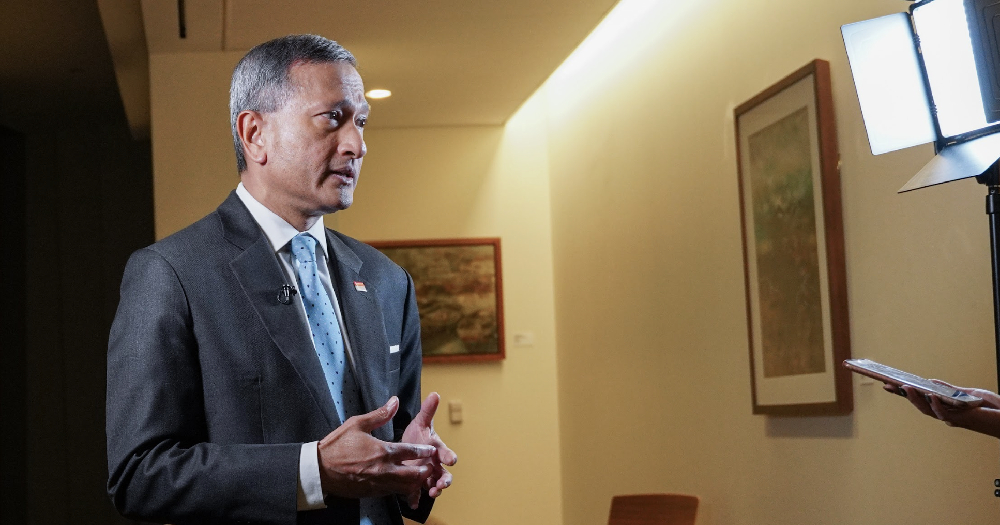Follow us on Telegram for the latest updates: https://t.me/mothershipsg
The rhetoric and actions that have occurred across the Taiwan Strait in recent weeks is an area of "grave concern", Foreign Affairs Minister Vivian Balakrishnan said on Sunday, Sep. 25.
Both China and U.S. understand severity of situation if tensions not managed
Nevertheless, Vivian said he's "a little bit hopeful", given the meeting between Chinese Foreign Minister Wang Yi and U.S. State Secretary Antony Blinken.
"I think both sides understand the gravity of the situation. We can only hope that cool heads, good sense, could prevail, and they will avoid the possibility of mishaps, miscalculations, accidents, or worse, getting into an escalatory spiral," he said.
Speaking to the media at a virtual doorstop after giving his address at the 77th session of the United Nations (UN) General Assembly at the UN headquarters in New York, he further said that he hopes Chinese President Xi Jinping and his U.S. counterpart Joe Biden will meet face to face.
He also hoped that the two world leaders would arrive at some modus vivendi, referring to some sort of agreement for both powers to coexist peacefully.
 Image via Ministry of Foreign Affairs
Image via Ministry of Foreign Affairs
The minister added that this arrangement could then set the tone for officials, ministers and the stakeholders involved to conduct constructive and positive negotiations.
He noted that while not all differences can be removed, they could at least manage the contention, damper down tensions, and deescalate the situation.
Xi & Biden likely to meet in Bali
Indonesian President Joko Widodo had said in an interview with Bloomberg on Aug. 18 that both leaders will be attending the G20 Summit in Bali in November.
On Sep. 6, when asked if he would meet Xi, Biden said he would "see" Xi if the Chinese leader also attends the summit, CNBC reported.
Vivian had also referred to Biden's remarks at the UN earlier, which he described as "a careful speech" which reiterated the traditional U.S. position on Taiwan and China.
Biden said the U.S. seeks to "uphold peace and stability" across the Taiwan Strait, and that the country remains committed to its "one China policy" and continues to oppose "unilateral changes in the status quo by either side".
Under the U.S.' "one China policy", which is separate from China's "one China principle", Washington recognises the People's Republic of China as the "sole legal government of China".
However, Washington has never acknowledged Beijing's claims of sovereignty over Taiwan.
China accused U.S. of sending "dangerous signals" on Taiwan
Following Blinken's meeting with Wang on Sep. 23, where Blinken emphasised the importance of maintaining peace and stability across the Taiwan Strait, the Chinese foreign ministry said in a statement that the U.S. was sending "very wrong, dangerous signals" on Taiwan, Reuters reported.
 Image via Chinese embassy in the U.S.
Image via Chinese embassy in the U.S.
The more unbridled Taiwan's "independence activity" is, the less likely there would be "a peaceful settlement", they said.
They also reiterated that because the Taiwan issue is an "internal Chinese matter", the U.S. has no right to interfere.
China views self-ruled Taiwan as part of its territory that must one day "return" to the mainland fold, even if force were to be used.
Rising tensions in the Taiwan Strait
Taiwan maintains that it is willing to engage in "meaningful dialogue" with China, with Taiwanese Premier Su Tseng-chang saying in June 2022 that engagement should be done on an equal basis and without political preconditions.
He added that with China's "harassment" of the island using "military aircraft, warships", as well as "unreasonable suppression and political actions", the one being "most unreasonable" is China.
After Taiwanese President Tsai Ing-wen, who is arguably "pro-status quo" instead of "pro-independence", won her first election in 2016, China cut off official dialogue with Taiwan.
Tsai has refused to accept the 1992 consensus, saying that Taiwan does not agree with Beijing's definition of the consensus as being "one China and "one country, two systems".
Beijing subsequently made use of Tsai's refusal to acknowledge the consensus as justification to tighten its squeeze on Taiwan, such as influencing Taiwan's few remaining diplomatic allies to switch diplomatic recognition to Beijing, and ramping up military pressure on the island, to name a few.
Russia's recent moves are "bad signs" of conflict receiving resolution
Unlike his outlook on the relations between China and the U.S., however, Vivian was much less optimistic about the war in Ukraine.
He opined that present conditions are "not right for negotiations", adding that Russia's recent moves, such as partial mobilisation of additional recruits and conscripts to aid its war effort, are "bad signs".
"They show escalating tension and the fact that you are not going to get a quick resolution," he said. "We will have to wait and see."
Nevertheless, he acknowledged that the UN Secretary General Antonio Guterres had recently managed to broker a deal to allow the exportation of grain from Ukraine through the Black Sea, referring to it as "a remarkable success, considering all the circumstances".
He also expressed his confidence towards the utility of multilateralism, adding that while it is "very difficult", the UN and other international institutions has been playing a "constructive" role in certain conflict zones.
For instance, officials from the International Atomic Energy Commission had been stationed at the Zaporizhzhia nuclear power plant -- the largest in Europe -- in Ukraine. It has been controlled by Russian forces since March 2022.
Although Russia has lashed out against western nations for what its foreign minister Sergei Lavrov termed as a "grotesque" campaign against Russians, no other country, including China, had backed it at the UN General Assembly, The Guardian reported.
In his speech, Wang even called for peace talks between Russia and Ukraine, and urged them to "keep the crisis from spilling over", signalling a slight shift in relations with Russia, as compared to their pledge to a "no limits" partnership back in early February, shortly before Russia invaded Ukraine.
Russia, however, appeared to be intent on maintaining its relations with China, with Lavrov refusing to respond to questions if there has been any pressure from its ally China, choosing instead to place the blame solely on the West.
Read more:
Top image via Ministry of Foreign Affairs
If you like what you read, follow us on Facebook, Instagram, Twitter and Telegram to get the latest updates.
